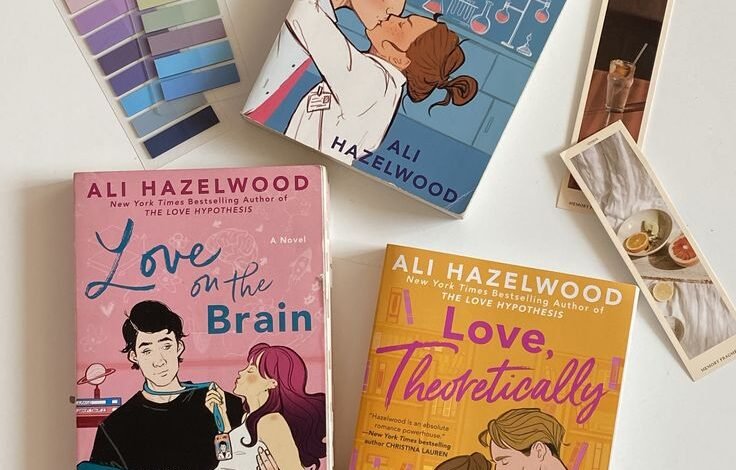Love on the Brain Book: Plot, Characters, and Review
Love on the Brain Book: Plot, Characters, and Review

Introduction
What does love have to do with brain health? A lot more than you might think. Ali Hazelwood’s acclaimed book, Love on the Brain, offers an insightful exploration into the profound connections between love, relationships, and mental well-being. Although the story itself is a contemporary romance, the themes it touches on extend beyond matters of the heart—they serve as a reminder of the tangible impact our relationships have on our mental and emotional health.
Whether it’s romantic relationships, friendships, or even self-love, Hazelwood’s storytelling aligns with research that suggests love, in all its forms, plays a vital role in brain health. This blog will examine the connection between love, brain health, and overall wellness, drawing from the insights in Love on the Brain. Along the way, we’ll discuss key ideas, scientific evidence, and practical tips to nurture your mental well-being through healthy, positive relationships.
Exploring Thematic Depth in Love on the Brain
At its core, Love on the Brain revolves around the themes of connection, empathy, and understanding—all of which are critical not only in relationships but also in psychological health. Hazelwood examines how human emotions and bonds are deeply tied to the brain’s functionality, unveiling a captivating intersection of neuroscience and emotional storytelling.
By exploring the characters’ navigation of love, trust, and vulnerability, the book subtly but effectively demonstrates how building healthy emotional connections can enhance overall well-being. The characters’ journeys offer relatable insights into strengthening interpersonal relationships while also prioritizing self-care and emotional growth.
But the depth goes further than just fictional storytelling. Modern science frequently supports these themes, proving that love and relationships can directly impact multiple aspects of brain health, including emotional regulation, cognitive function, and stress management.
Love and Its Science-Backed Effect on Mental Health
Numerous studies have shown that love and positive social connections can improve mental health and brain function. Here’s how love affects the brain and overall well-being, with research-based insights that align with the themes in Love on the Brain.
1. Love Reduces Stress
The hormone oxytocin, often called the “love hormone,” plays a crucial role in reducing stress. According to a study published in Psychoneuroendocrinology, physical touch or emotional connection—whether through a loving relationship, a close friendship, or even spending quality time with a pet—promotes oxytocin release. This helps lower cortisol levels, reducing stress and anxiety.
Hazelwood’s characters embody this phenomenon, demonstrating how mutual trust and affection in safe environments can provide solace during challenging times.
2. Improved Cognitive Health
Being in positive, stimulating relationships has been shown to improve cognitive performance. A report published by The American Journal of Psychiatry highlights how strong interpersonal bonds can enhance memory and focus, possibly due to the reduction in cortisol, which can harm brain cells.
Characters in Love on the Brain illustrate this concept, showing how the support of loved ones can foster moments of clarity and inspired thinking, even in high-pressure environments.
3. Lower Risk of Depression
Feelings of isolation can significantly elevate risks of depression. On the flip side, cultivating loving relationships provides emotional support and decreases these risks. Hazelwood’s narrative underpins this, as her characters often find personal strength and emotional stability through their close connections.
These scientific insights underscore the very real relationship between love and mental health. They reveal how the warmth of meaningful relationships plays a role in creating a healthier, more resilient mind.
Practical Tips From Love on the Brain: Strengthening Brain Health Through Love
While Love on the Brain might be a fictional story, its thematic lessons include actionable takeaways that you can use in your daily life. Here are some practical tips for improving your brain health by fostering love and connection.
Build Emotional Intelligence
Hazelwood places significant emphasis on the importance of empathy and understanding in relationships. Take the time to actively listen and validate the feelings of the people you care about. Emotional intelligence fosters deeper trust and connection, paving the way for stronger personal bonds and better mental health.
Prioritize Quality Over Quantity in Relationships
It’s not the number of relationships that matter—it’s the quality. Surround yourself with people who nurture your growth and bring out the best in you. Meaningful relationships stimulate oxytocin production and create a foundation of emotional support, improving your resilience to life’s challenges.
Practice Daily Acts of Gratitude
Just as characters in the book demonstrate appreciation for one another, actively practicing gratitude can greatly improve your relationship satisfaction. According to Harvard research, expressing gratitude strengthens interpersonal connections by fostering greater emotional intimacy.
Engage in Self-Love
Self-love and kindness are cornerstones of brain health. Hazelwood’s work hints at how confidence and self-acceptance are tied to overall well-being. Create daily rituals of self-care, such as journaling, exercising, or simply taking moments to reflect and recharge.
Stay Socially Active
Social interaction is essential for brain function. Whether it’s a quick lunch with a friend or a meaningful phone call, make an effort to maintain a social routine that nourishes both your mind and heart.
Inspired Readers, Inspired Lives
The beauty of Love on the Brain is its ability to inspire readers to reflect on their relationships while also nudging them to nurture their emotional health. Many readers report feeling motivated to improve their connections with loved ones, rekindle old friendships, or even begin self-improvement journeys in the wake of the book.
The characters provide a mirror for readers to see themselves, their struggles, and their triumphs, inspiring change. For many, reading Love on the Brain acts as a gentle reminder to prioritize love and connection as a vital part of their wellness routine.
Why Love Matters for Your Brain
It’s easy to think of brain health as purely a matter of physical wellness—diet, sleep, and exercise. But as Love on the Brain vividly demonstrates, emotional connections are just as critical in maintaining a healthy mind. Love, in all its forms, is a powerful force for reducing stress, improving cognitive function, and enhancing overall mental health.
By bringing science and storytelling together, Love on the Brain has become more than just another contemporary romance novel. It’s a guide, a reflection, and a call to action to foster the forms of love that make us healthier and happier.
If you’re ready to take the next step toward better mental health, consider applying some of the lessons from Love on the Brain in your own life. Remember, building a healthy, happy brain starts with the connections you nurture.



